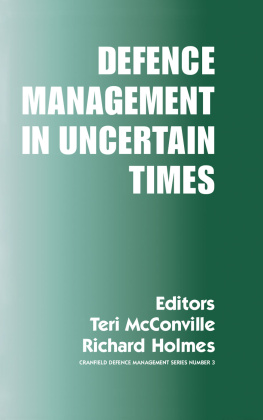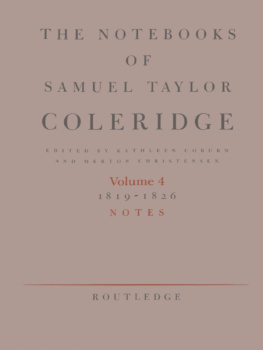Richard Holmes - Coleridge: Darker Reflections, 1804-1834
Here you can read online Richard Holmes - Coleridge: Darker Reflections, 1804-1834 full text of the book (entire story) in english for free. Download pdf and epub, get meaning, cover and reviews about this ebook. year: 1999, publisher: Pantheon Books, genre: Non-fiction / History. Description of the work, (preface) as well as reviews are available. Best literature library LitArk.com created for fans of good reading and offers a wide selection of genres:
Romance novel
Science fiction
Adventure
Detective
Science
History
Home and family
Prose
Art
Politics
Computer
Non-fiction
Religion
Business
Children
Humor
Choose a favorite category and find really read worthwhile books. Enjoy immersion in the world of imagination, feel the emotions of the characters or learn something new for yourself, make an fascinating discovery.
- Book:Coleridge: Darker Reflections, 1804-1834
- Author:
- Publisher:Pantheon Books
- Genre:
- Year:1999
- Rating:5 / 5
- Favourites:Add to favourites
- Your mark:
- 100
- 1
- 2
- 3
- 4
- 5
Coleridge: Darker Reflections, 1804-1834: summary, description and annotation
We offer to read an annotation, description, summary or preface (depends on what the author of the book "Coleridge: Darker Reflections, 1804-1834" wrote himself). If you haven't found the necessary information about the book — write in the comments, we will try to find it.
Coleridge: Darker Reflections, 1804-1834 — read online for free the complete book (whole text) full work
Below is the text of the book, divided by pages. System saving the place of the last page read, allows you to conveniently read the book "Coleridge: Darker Reflections, 1804-1834" online for free, without having to search again every time where you left off. Put a bookmark, and you can go to the page where you finished reading at any time.
Font size:
Interval:
Bookmark:
Darker Reflections

To Rose, with love
ADRIFT IN THE MEDITERRANEAN
Signals, Drums, Guns, Bells, & the sound of Voices weighing up & clearing Anchors. So Coleridge fled south aboard the Speedwell , expecting to die but half-hoping to be reborn. Monday April 9th, 1804, really set sailNo health or Happiness without Work.
Behind him he left his family under Southeys care in the Lake District; he left the Wordsworths and his love Sara Hutchinson; he left Charles Lamb and Daniel Stuart and all his London friends; each of them anxiously speculating about his future. Far art thou wandered now, wrote Wordsworth in The Prelude , in search of health,/And milder breezesSpeed thee well.
Ahead of him lay the glittering Mediterranean, the legendary outposts of Gibraltar, Malta and Sicily, a war-zone of fleets and harbour-fortresses, where he would fight his own battles against opium and despair. Do we not pity our past selves? he reflected in his new Notebook, using a special metallic pencil designed to withstand sea-salt. Is not this always accompanied by Hope? It makes the Images of the Past vividAre not vivid Ideas themselves a sort of pleasure, as Music whether sad or lively, is always Music?
Down in his cabin on the first night, he watched the lights of England recede along the Cornish coast through the brass porthole above his narrow berth. The 130-ton ship moved uneasily, not rolling on its beam, but rocking sharply from stem to stern, as a cruel Nurse rocks a screaming baby.
Coleridges ship the Speedwell was a two-masted merchant brig, lightly armed with fourteen guns, but carrying a heavy cargo of eighty-four cannons in her hold destined for Trieste. Smartly trimmed in silver and gold, she was one of the fastest merchants in the fleet, commanded by a thoughtful Scotsman, Captain John Findlay, from whom Coleridge gradually extracted much sea-lore, sailors yarns and sea-shanties.
She was part of the spring-time convoy of thirty-five ships, escorted by ten men-o-war and the flagship HMS Leviathan , going to join Nelsons fleet in the Mediterranean and carrying supplies to British and allied ports in the war against France and Spain. Having finally left Spithead on 9 April 1804, the first leg of their journey ran through the Bay of Biscay and round Cape St Vincent to Gibraltar.
As the French fleet under Villeneuve was bottled up by Nelsons squadron off Toulon, the greatest danger came from privateers and corsairs operating out of Spanish and North African ports. So Captain Findlay cheerfully instructed Coleridge: in a calm [they] will run out, pick up a merchant Vessel under the very stern of the Commodore, as a Fox will a Fowl when the Wolf dog that guards the poultry yard can only bark at him from his Chain. Coleridge kept a close eye on the wind throughout their voyage, as he did on all other maritime matters, so the whole imagery of the sea journey came to possess him.
By the second day he had found his sea-legs, and with hair flying and double-waistcoats flapping, he patrolled the deck agog with excitement, questioning and noting. Nothing seemed to escape his attention. If a merchantman lagged behind or failed to obey signals, the seventy-four-gun Leviathan fired warning shots at her Commodores strengthening Pills for the Memory, and a fine of five shillings.
Always there was great sea-Savannah rolling unpastured about them, in all its changing lights and sounds. The beautiful bright Slate, & the Soap stone colour by the Vessels side, in a brisk gale, immediately under the mast in a froth-cream, that throws itself into network, with its brisk sound, which the word brisk itself may be made to imitate by hissing on the isk
Along with the crated ducks, three pigs, the melancholy sheep and a ships cat with kittens, Coleridge had two fellow passengers. They shared the cabin in increasingly pungent intimacy as the voyage progressed. One was a purple-faced lieutenant on half pay, who largely restricted his attentions to the ships claret; the other was a plump and garrulous merry widow, a Mrs Ireland, who would have wanted elbow-room on Salisbury Plain.
The cabin conditions were extremely cramped, and probably not improved by Coleridges tendency in very gusty weather to vomit up his food without warning. The process intrigued him, as it was never accompanied by seasickness: it was an action as mechanical seemingly as that by which ones glass or teacup is emptied by a thwart blow of the Sea. Surprisingly, the merry Mrs Carnosity accepted this with good grace, and much worse which was to follow, after Gibraltar, when the mephitic stench from the bilge became overpowering.
Coleridge drew up a daily schedule for work in a perseverant Spirit of industry: it began with ginger tea and journal-writing, proceeded with a study of Wordsworths precious manuscript of the Prelude before dinner, and in the afternoon relaxed into Italian lessons and Dante; finally the night-watch was assigned to poetry and the completion of Christabel. But after the ginger tea and journal, Coleridge usually found that he flagged and spent his time up on deck, or dozing uneasily on his bunk under a pile of books. These included, besides Dante and a portable Italian dictionary, a technical work on mineralogy, the meditations of Marcus Aurelius, and the complete works of Sir Thomas Browne, together with a mutinous crew of fresh lemons that he chewed to protect against scurvy.
He has much exercised by the bunk, which his large frame swaddled in double coats and double trousers, reduced to a precarious mantel. On inspection it measured five and a half feet long by twenty inches wide. It was fine for sitting, eating, drinking, writing, even shaving: it fails only in its original purpose, that of lying & sleeping: like a great Genius apprenticed to a wrong Trade. But above it was the brass porthole upon which he lavished all his ingenuity. Finding it edged with small iron rings he laced these with cords to form a net, and stacked the bottom half with books to make a flat shelf for his kit. Inside this seamanlike cupboard he carefully arranged his shaving things, teacup and soup plate, supply of lemons and portable inkstand, whose unmoving pool of black ink seemed a suggestive contrast to the ceaseless lurching of the ship. By charm and talismanic privilege: one of those Smooth places in the Mediterranean, where the breakers foam in a circle around, yet send in no wrinkles upon the mirror-bright, mirror-smooth Lacus in mare.
Like the charmed pool of the imagination, the steady inkwell amidst the churning sea was Imperium in Imperio, a realm within a realm.
Up on deck, he chatted to the sailors he always admired a neat handed Fellow who could shave himself in a storm without drawing blood and recorded sextant readings, compass-bearings, cloud formations, star patterns and semaphore messages through the squadron. Above all he recorded the huge, beautiful complexity of the ships sails. They were constantly re-set throughout the fleet to form an endless series of visual harmonies. On Saturday, 14 April, he made no less than eleven pages of notes on these sail shapes. What interested him was their aesthetic values, their painterly suggestions of form and function, of energy transferred between curve and straight line. The harmony of the Lines the ellipses & semicircles of the bellying Sails of the Hull, with the variety of the one and the contingency of the other.
He puzzled over their obscure resemblance to human shapes, to gestures of mental alertness, determination and attention. The height of the naked mast above the sails, connected however with them by Pennant & Vane, associated I think, with the human form on a watch-tower: a general feeling e.g. the Men on the tops of conical mountainsin Cumberland and Westmoreland. Wordsworth indeed, as a man-o-war, in full sail.
Font size:
Interval:
Bookmark:
Similar books «Coleridge: Darker Reflections, 1804-1834»
Look at similar books to Coleridge: Darker Reflections, 1804-1834. We have selected literature similar in name and meaning in the hope of providing readers with more options to find new, interesting, not yet read works.
Discussion, reviews of the book Coleridge: Darker Reflections, 1804-1834 and just readers' own opinions. Leave your comments, write what you think about the work, its meaning or the main characters. Specify what exactly you liked and what you didn't like, and why you think so.
















